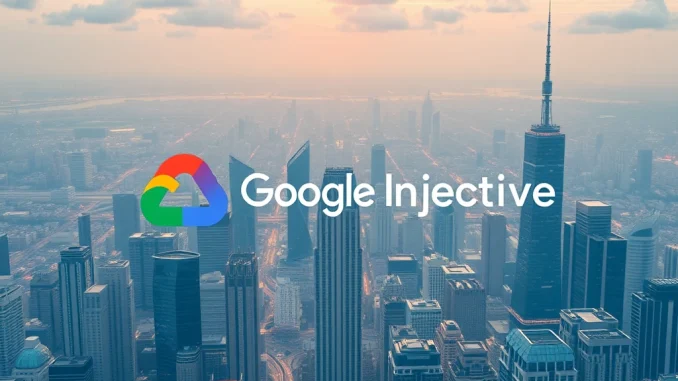
Hold onto your hats, crypto enthusiasts! The blockchain world just got a major power-up. Injective, the lightning-fast layer-1 blockchain built for finance, has announced a groundbreaking collaboration that’s sending ripples of excitement through the Web3 space. Tech giant Google Cloud is officially joining the Injective ecosystem, launching both a validator and a suite of cutting-edge Web3 tools on the Injective blockchain. This isn’t just another partnership; it’s a significant leap forward for Injective and the broader decentralized web. Let’s dive into what this game-changing announcement means for you, the future of blockchain, and the evolution of Web3 development.
Why is Google Cloud’s Entry into Injective a Revolutionary Move?
Think about it – Google Cloud, a titan in cloud computing, is now directly involved in validating transactions and providing essential infrastructure on Injective. This is a monumental endorsement for Injective’s technology and vision. But what exactly does it mean? Let’s break down the key aspects:
- Enhanced Security and Reliability: Google Cloud operating as a blockchain validator significantly strengthens Injective’s network security. Validators are the backbone of any blockchain, responsible for verifying transactions and maintaining network integrity. Having Google Cloud as a validator adds a layer of robust reliability and trust, given their extensive infrastructure and security expertise.
- Scalability Boost: Google Cloud’s involvement can contribute to Injective’s scalability. Their infrastructure can handle massive amounts of data and processing power, potentially enabling Injective to handle even larger transaction volumes and support more complex decentralized applications (dApps).
- Mainstream Adoption Catalyst: The association with Google Cloud brings immense credibility to Injective. It signals to institutions and developers that Injective is a serious player in the blockchain space, potentially accelerating mainstream adoption and attracting more projects to build on the Injective blockchain.
- Developer Empowerment: The launch of new Web3 tools by Google Cloud is a massive win for developers on Injective. These tools can simplify the development process, provide better resources, and foster innovation within the Injective ecosystem.
In essence, Google Cloud isn’t just dipping its toes into Injective; they’re diving in headfirst, bringing their considerable resources and expertise to bolster the platform’s foundation. This is a powerful signal that Injective is poised for significant growth and impact.
Unpacking the Power of Google Cloud’s Web3 Tools for Injective Developers
Beyond validation, the introduction of new Web3 tools by Google Cloud is arguably the most exciting aspect for the Injective community. What kind of tools are we talking about, and how will they benefit developers? While specific details are still emerging, we can anticipate tools that will likely focus on:
- Simplified Deployment: Tools to streamline the deployment of smart contracts and dApps on Injective. This could involve user-friendly interfaces, pre-built templates, and automated deployment processes.
- Enhanced Development Environments: Improved SDKs (Software Development Kits), APIs (Application Programming Interfaces), and development libraries to make coding on Injective more efficient and less complex.
- Data Analytics and Insights: Tools to analyze on-chain data, providing developers with valuable insights into user behavior, transaction patterns, and network performance. This data can be crucial for optimizing dApps and making informed decisions.
- Integration with Google Cloud Services: Seamless integration with other Google Cloud services, such as data storage, AI/ML (Artificial Intelligence/Machine Learning) capabilities, and security solutions. This opens up a world of possibilities for building more sophisticated and feature-rich dApps on Injective.
Imagine developers being able to leverage Google Cloud’s powerful infrastructure and familiar tools to build the next generation of decentralized financial applications on Injective. This partnership has the potential to significantly lower the barrier to entry for developers and accelerate the pace of innovation within the Injective ecosystem.
What are the Potential Benefits of this Google Cloud – Injective Alliance?
The benefits of this collaboration are multifaceted and extend to various stakeholders within the crypto ecosystem. Let’s explore some key advantages:
| Benefit | Description | Impact |
|---|---|---|
| Increased Network Security | Google Cloud as a validator strengthens network resilience. | More secure and trustworthy Injective blockchain. |
| Improved Scalability | Google Cloud’s infrastructure supports higher transaction volumes. | Faster transaction processing and greater capacity for dApps. |
| Developer Empowerment | New Web3 tools simplify development and offer powerful resources. | Faster development cycles, more innovative dApps, and a thriving developer community. |
| Enhanced Credibility | Google Cloud’s involvement validates Injective’s technology. | Increased institutional interest, mainstream adoption, and greater user trust. |
| Ecosystem Growth | Attracts more projects, developers, and users to the Injective ecosystem. | Expansion of the Injective network and its utility. |
This partnership isn’t just about technology; it’s about building a stronger, more accessible, and more innovative future for decentralized finance and the broader Web3 landscape. It’s about bringing the power of cloud computing to the world of blockchain, and Injective is at the forefront of this exciting evolution.
Are There Any Challenges to Consider?
While the Google Cloud and Injective partnership is overwhelmingly positive, it’s always wise to consider potential challenges or areas to watch:
- Centralization Concerns: Having a major centralized entity like Google Cloud heavily involved in a decentralized ecosystem might raise some eyebrows regarding centralization risks. However, it’s important to remember that Injective is still a decentralized blockchain with multiple validators. Google Cloud is just one participant in a larger network.
- Tool Adoption: The success of the Web3 tools hinges on developer adoption. Google Cloud and Injective will need to ensure these tools are user-friendly, well-documented, and genuinely address the needs of developers building on Injective.
- Long-Term Commitment: The long-term impact will depend on the sustained commitment of both Google Cloud and Injective to this partnership. Continuous development, support, and collaboration will be crucial to realizing the full potential of this alliance.
These are not necessarily roadblocks, but rather points to consider as this exciting partnership unfolds. The benefits appear to significantly outweigh the potential challenges, and the overall outlook for Injective and its ecosystem is incredibly bright.
The Future is Bright for Injective and Web3 Development
Google Cloud’s decision to launch a validator and Web3 tools on Injective is a resounding vote of confidence in the future of decentralized finance and the power of blockchain technology. It’s a **powerful** testament to Injective’s innovative approach and its potential to reshape the financial landscape.
For developers, this partnership opens up a wealth of new opportunities and resources. The enhanced tooling and infrastructure will empower them to build more sophisticated, scalable, and user-friendly dApps on the Injective blockchain. For users, it promises a more secure, reliable, and innovative DeFi experience.
In conclusion, the collaboration between Google Cloud and Injective is more than just a news headline; it’s a pivotal moment for the Injective ecosystem and a significant step forward for the entire Web3 development space. Keep your eyes on Injective – they are undoubtedly a project to watch as they continue to push the boundaries of decentralized finance and blockchain technology, now with the formidable backing of Google Cloud.



